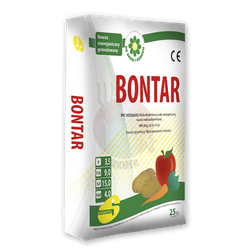- BONTAR is a multi-component inorganic fertilizer, produced on the basis of partially decomposed soft phosphates with the addition of sulphates - potassium, ammonium and magnesium.
- BONTAR NPK(Mg) 3,5-9-15-(4)
Properties
Bontar granulated fertilizer contains potassium only in the sulphate form. It has a low chloride content, so it can be used to fertilize e.g. potatoes, fruit trees and shrubs. The ingredients contained in the fertilizer have a beneficial effect on the growth and development of plants, and ultimately on their quality.
Regular and proper fertilization of crops allows you to achieve high yields and protects plants against harmful external factors.
Why is it worth using this fertilizer?
- It affects healthy and nutritious crops.
- Stimulates proper growth and development of plants.
- It is gradually released from the soil.
- It immunizes plants and protects them from the beginning of the vegetation process.
- Generates money savings due to the high efficiency of the product.
- It guarantees a low cost of nutritional treatments dedicated to plants.
- It is available in economical packaging.
Where to use this fertilizer?
In the cultivation of edible potatoes, Bontar fertilizer can be used both before sowing and as top dressing under one of the care treatments. Most vegetables grown in field conditions are sensitive to chlorine in the initial period of growth - at the germination and seedling stages. Therefore, the fertilizer is recommended for use both before sowing seeds, planting seedlings, and as early top dressing. On vegetable plantations, the fertilizer should be mixed with the soil to a depth of approx. 10 cm. In orchards and tree nurseries, fertilizer should be evenly distributed around the tree or shrub. The condition for the effectiveness of this treatment is mixing the fertilizer with the soil or irrigating the plantation.
Recommended fertilizer doses in kg/ha
Cultivated plants Fertilizer dose
depending on the soil's P and K content
Edible potatoes 300 – 400
Fruit trees and bushes 200 – 400
Coniferous tree nurseries 200 – 600
Tobacco 300 – 400
Beans and peas 300 – 800
Onion 200 – 600
Strawberries 200 – 300
Raspberries 200 – 300
Cabbage 400 – 800
Carrots 200 – 400
Tomatoes 200 – 400





